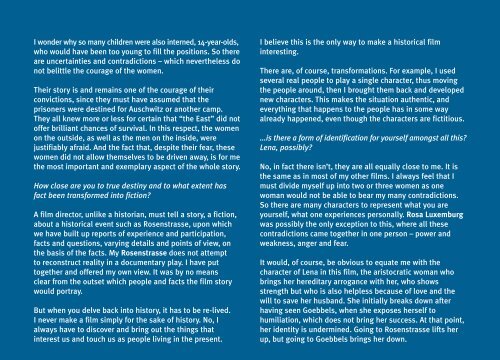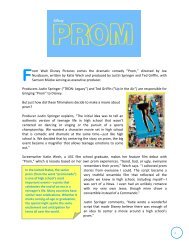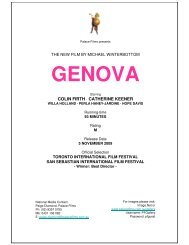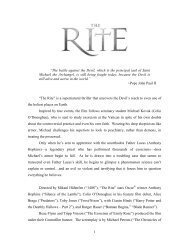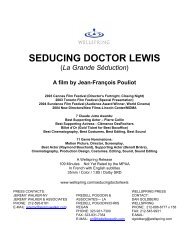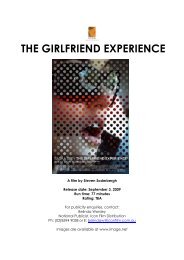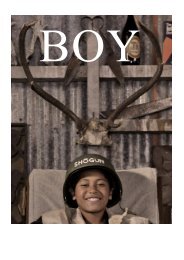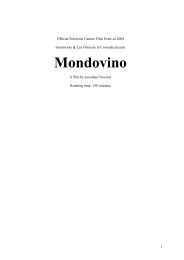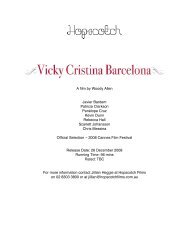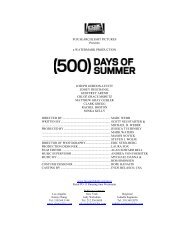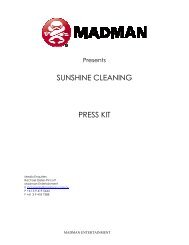ROSENSTRASSE
ROSENSTRASSE
ROSENSTRASSE
Create successful ePaper yourself
Turn your PDF publications into a flip-book with our unique Google optimized e-Paper software.
I wonder why so many children were also interned, 14-year-olds,<br />
who would have been too young to fill the positions. So there<br />
are uncertainties and contradictions – which nevertheless do<br />
not belittle the courage of the women.<br />
Their story is and remains one of the courage of their<br />
convictions, since they must have assumed that the<br />
prisoners were destined for Auschwitz or another camp.<br />
They all knew more or less for certain that “the East” did not<br />
offer brilliant chances of survival. In this respect, the women<br />
on the outside, as well as the men on the inside, were<br />
justifiably afraid. And the fact that, despite their fear, these<br />
women did not allow themselves to be driven away, is for me<br />
the most important and exemplary aspect of the whole story.<br />
How close are you to true destiny and to what extent has<br />
fact been transformed into fiction?<br />
A film director, unlike a historian, must tell a story, a fiction,<br />
about a historical event such as Rosenstrasse, upon which<br />
we have built up reports of experience and participation,<br />
facts and questions, varying details and points of view, on<br />
the basis of the facts. My Rosenstrasse does not attempt<br />
to reconstruct reality in a documentary play. I have put<br />
together and offered my own view. It was by no means<br />
clear from the outset which people and facts the film story<br />
would portray.<br />
But when you delve back into history, it has to be re-lived.<br />
I never make a film simply for the sake of history. No, I<br />
always have to discover and bring out the things that<br />
interest us and touch us as people living in the present.<br />
I believe this is the only way to make a historical film<br />
interesting.<br />
There are, of course, transformations. For example, I used<br />
several real people to play a single character, thus moving<br />
the people around, then I brought them back and developed<br />
new characters. This makes the situation authentic, and<br />
everything that happens to the people has in some way<br />
already happened, even though the characters are fictitious.<br />
...is there a form of identification for yourself amongst all this?<br />
Lena, possibly?<br />
No, in fact there isn’t, they are all equally close to me. It is<br />
the same as in most of my other films. I always feel that I<br />
must divide myself up into two or three women as one<br />
woman would not be able to bear my many contradictions.<br />
So there are many characters to represent what you are<br />
yourself, what one experiences personally. Rosa Luxemburg<br />
was possibly the only exception to this, where all these<br />
contradictions came together in one person – power and<br />
weakness, anger and fear.<br />
It would, of course, be obvious to equate me with the<br />
character of Lena in this film, the aristocratic woman who<br />
brings her hereditary arrogance with her, who shows<br />
strength but who is also helpless because of love and the<br />
will to save her husband. She initially breaks down after<br />
having seen Goebbels, when she exposes herself to<br />
humiliation, which does not bring her success. At that point,<br />
her identity is undermined. Going to Rosenstrasse lifts her<br />
up, but going to Goebbels brings her down.


